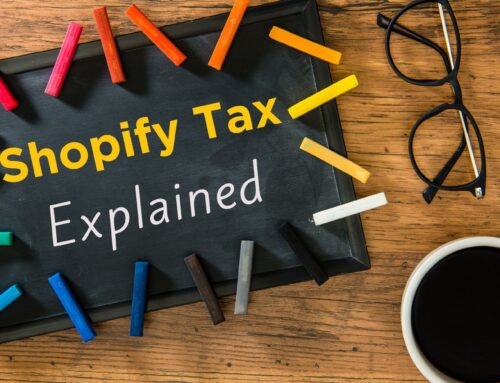
If you have ever struggled with doing your own Shopify bookkeeping, and considered whether to seek help from an accounting professional, you may be wondering, “What does a Shopify bookkeeper do, anyway?” I get asked this question all the time when talking with online sellers who contact me about the Shopify bookkeeping services we offer at VM Wasek. They want to know what do we do, how do we do it, and how does it make life easier for them? Those are all great questions to ask! When it comes to e-Commerce accounting and bookkeeping, there are many pieces of the puzzle that need to be brought together. That’s where the Shopify bookkeeper comes in. Keep reading, or click on the video linked below to learn what a Shopify bookkeeper does for you, and what that relationship should ideally look like.
Click on the video linked below to watch: What does a Shopify Bookkeeper do?
Modern-day bookkeepers
First, it’s important to understand that the bookkeeping profession has come a long way. We’re no longer doing data entry and using calculators and doing ‘nerdy things’. Modern virtual accountants and bookkeepers are really focused on helping you growing your business and having visibility into your financials.
The role of a Shopify bookkeeper
The Shopify bookkeeper is really part of your financial team. Yes, they focus on maintaining the books and tracking the financials, but there are also other areas where they can be an important part of your financial team. A knowledgeable Shopify bookkeeper can help you with sorting out sales taxes, preparing for income tax time, and understanding some of the legal requirements for selling online.
The primary goal of working with a Shopify bookkeeper is to free you up so you can do what you do best. By handling the bookkeeping details for you, they provide you with financials that tell a clear story of how your business is doing, with visibility into your profits. Clear and accurate financials are important not only to you, but also your investors, lenders, tax preparer, and others. The Shopify bookkeeping process should be proactive, use best practices, and leverage proven financial systems, integrations, and accounting methods to make everything as simple and accurate as possible.
E-commerce accounting
A good Shopify bookkeeper understands the complexities of e-commerce. When it comes to e-Commerce accounting and bookkeeping, there are many pieces of the puzzle that need to be brought together. For example, there are timing differences to deal with, integrations, and knowing which data to bring into QuickBooks. Managing inventory, dealing with sales taxes, working with payment processors, recording fees, and dealing with Paypal are all part of the unique challenge of Shopify bookkeeping.
Virtual Delivery
A great Shopify bookkeeper should also be able to work with you virtually. If you’re running a Shopify business from home or even with a team from a small office, why shouldn’t your bookkeeper be able to help you remotely?
Cloud-based accounting software and technologies
At my company, VM Wasek, we use QuickBooks Online. Other bookkeepers may prefer to use Xero. Those are the two major cloud-based accounting software programs that you’ll come across. We use QuickBooks and utilize certain app integrations to bring in the data that we need. This allows us to handle everything for our clients virtually and provide them with easy access to all the information they need on a day-to-day basis.
You’ll need to share accountant’s access with your bookkeeper. That means that you’re working on your QuickBooks and sharing that file with your bookkeeper. You own the data, your bookkeeper doesn’t.
A good Shopify bookkeeper should understand the financial data flow between all of the moving pieces and how that data flows into QuickBooks Online. For example, from Shopify, we’re going to bring transactions into QuickBooks Online using A2X, because we can bring in summarized transactions. For banking transactions, we’re going to connect QuickBooks Online to the business bank and credit card accounts. And for inventory, then we may look at using Shopify inventory or other inventory apps. Again, it’s all about putting together that puzzle and understanding how all of the pieces fit together in order to get the financial data into QuickBooks.
The Shopify bookkeeper should handle your books securely using the latest cloud-based technologies. They should use Zoom for client meetings, coaching, and consulting sessions. They should also collaborate using a secure document portal, rather than emailing you documents back and forth.
What to Expect
A lot of people think that bookkeepers are just doing data entry, which is really and old-fashioned view of bookkeeping. As a modern accountant and bookkeeper, that really couldn’t be the further from the truth.
What does a Shopify bookkeeper actually do with your books:
- They record all components of income – gross sales, refunds, returns, deductions, fees, etc. You’ll be able to see all of that on your profit and loss report.
- They update your inventory and cost of goods sold. So again, another layer of complexity that goes into doing the books and then actually giving you clarity into your profits.
- They categorize and record all of your business expenses.
- They reconcile your business bank and credit card statements. This is a key step in doing the books. It’s actually ensuring that all of the transactions that are recorded on the books match the transactions that are reflected on the business bank and credit card statements.
- They reconcile income to sales channels and amounts received to payment processor payouts. This is key in doing e-commerce accounting. Even though we are using an app to bring in the income from sales channels into QuickBooks, we need to confirm that everything matches up, including fees and returns.
What They’ll Expect from You
When I talk to e-commerce sellers, I’m often asked “Do I need to give my bookkeeper my receipts?” I understand why that would be a concern, because if you have to sit there and give your bookkeeper all of your receipts, that’s very time-consuming. It can feel almost as if you’re doing your own books and the goal here is to free your time to focus on other things. Here in the U.S., you don’t need to send your bookkeeper any documents or receipts. Your bookkeeper may request them, but technically you don’t have to send them. At my company, VM Wasek, we don’t request those from our clients.
The next question is probably “How will my bookkeeper know how to categorize my transactions if I don’t send my receipts?” One of the things that we do when we onboard a new client at my firm is sit down with them and go over all the different types of expenses they’ll have and the vendors they expect to use. Over time, we notice that probably 80% of business transactions are repetitive from month to month. Generally speaking, you’re probably buying from the same suppliers and vendors on a regular basis. But for that 20% of transactions we don’t know, we’ll send our clients a list of questions once a month when we need more information about those transactions. With this system, they only have to provide information on the vendors in question, not every single expense.
And finally, you may still be wondering if you should be doing your own bookkeeping. Perhaps you want to understand the transactions and want to do your books on your own. My answer to you is, if you’re going to drive a race car and be a race car driver, then your focus should be on going fast and winning races. That race car driver lets the experts work on the engine. They have a whole team backing them up, working on the engine, taking care of things in the background. That’s the role of the Shopify bookkeeper. We are experts at working on the engine and letting you go fast and win races.
Closing
Now that I’ve explained what a Shopify bookkeeper does, how they do it, and what they need from you, I hope you will have a better idea of how they can fit into your financial team. As I’ve said before, finding the right bookkeeper for your growing Shopify business can make a huge difference in your success, your profitability, and your stress levels. If you’re considering working with a bookkeeper specializing in Shopify, and want to learn more about my services, VM Wasek specializes in e-commerce for Shopify, Amazon, and Walmart sellers. Click on this link to learn more about my services and see if my team is a good fit to help you elevate your e-commerce business and reach your goals.
If this content is helping you, stay tuned for more Shopify bookkeeping tips, and subscribe to my YouTube channel: 5 Minute Bookkeeping, where you will find a dedicated playlist for e-commerce accounting for online sellers. Also, make sure to get a copy of my free Shopify Bookkeeping Blueprint – a guide to help you confidently set up and streamline your Shopify financials.




